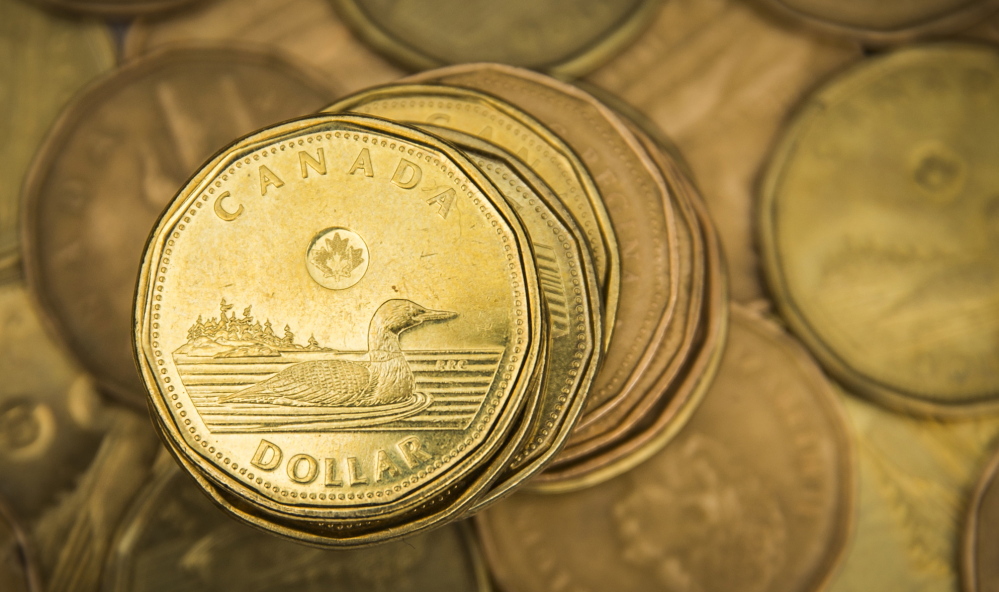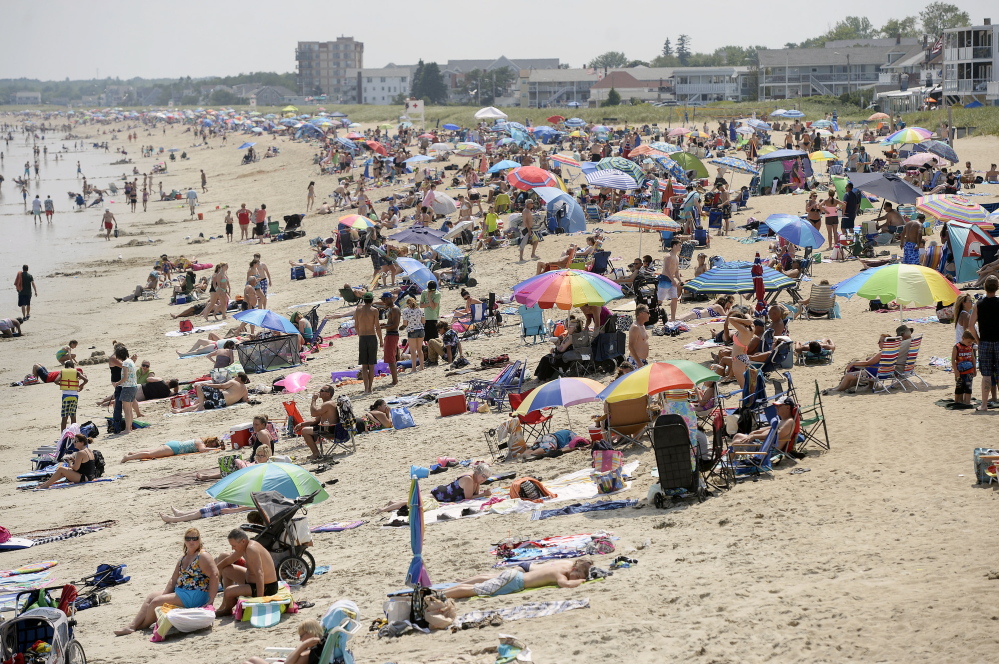The height of the summer tourism season is fast approaching, but Sarah Diment is still trying to fill a hotel room left vacant when a guest from Quebec canceled a two-week booking.
The plummeting value of the Canadian dollar, or loonie, was given as the reason for the cancellation, said Diment, a third-generation owner of the Beachmere Inn. Her Ogunquit hotel offers ocean-view suites that cost up to $360 per night.
In Canadian dollars, though, the hotel room costs $457 – 26 percent more than it did just two years ago.
Diment said fewer Canadians are staying at her hotel because the loonie’s buying power has tumbled so much. Once on par with the U.S. dollar, the loonie is now worth 78 cents.
“It’s definitely had an impact,” she said of the exchange rate.
Whether it’s at the beach or in big box stores, Canadians are less visible in Maine this summer, according to observations of those in the tourism industry. The number of Canadian tourists is expected to decline to about 4 million versus the more than 5 million who vacationed here in 2013, when there was more parity between the currencies, according to state estimates.
And it’s not just the value of the loonie that’s the problem. Families limit discretionary spending when they worry about their jobs, and Canadians have reason to worry.
During the global financial crisis that began in 2008, Canada’s economy outperformed the United States’, but now the tables are turned. While the United States’ economy continues to recover, Canada’s economy is shrinking.
Canada’s gross domestic product shrank in the first quarter by 0.6 percent, the first contraction in four years and the largest since 2009. Many economists believe that Canada is already in recession.
Canada’s problems don’t stay in Canada, though. In any given year, Canada is either the second or third most important market for Maine’s tourism industry, according to an annual online survey conducted for the Maine Office of Tourism.
SHORTER STAYS AND LESS OFTEN
In 2014, 22 percent of visitors came from Massachusetts. Tied at second place were New York and Canada at 16 percent.
Nearly half of the Canadian visitors came from Ontario, which by far is Canada’s most populous province. Four percent came from Quebec, 3 percent from New Brunswick and 1 percent from Nova Scotia.
An estimated 5.5 million Canadians visited Maine and spent $1.3 billion in 2013, when the Canadian and U.S. dollar were closer to parity, according to the study.
In 2014, when the loonie sank below 90 U.S. cents, the number of Canadian visitors declined by 24 percent to 4.2 million.
Based on advanced bookings, this year looks similar to 2014, said Carolann Ouellette, director of the Maine Office of Tourism.
But others in the industry say 2015 will be worse.
Hotel managers say business this year started off slower than they had anticipated and that there are noticeably fewer Canadians, said Greg Dugal, executive director of the Maine Innkeepers Association.
Many Canadians who are coming to Maine this summer aren’t staying as long as they have in the past, he said. And some who come here every summer aren’t coming at all.
During the Great Recession, when many Americans canceled their summer vacations, Canadians continued to visit Maine and spend money here.
“In 2009 they saved us,” Dugal said. “It’s almost like the opposite is occurring this year.”
The sandy beaches in York County are the biggest draw for Canadians from Quebec.
The Québécois traditionally arrive in the greatest numbers in the second half of July, when the Canadian construction industry shuts down for a month.
For some hotels in Old Orchard Beach, Québécois make up more than half of the guests between mid-July and mid-August.
Fred Kennedy, owner of the Alouette Beach Resort, said there’s a greater proportion of American guests now because Canadians are cutting their vacations short.
He’s not too worried, though. That’s because businesses that cater to both Americans and Canadians benefit from having two revenue streams, he said.
“There’s always a buffer,” he said. “If the economy goes south like it did in 2008, the Canadians make up for it. Now the Canadian economy is going south, and the American economy is doing pretty good. It seesaws back and forth.”
Rather than cut their stays short, some Canadians are doubling up in hotel rooms. Melanie Jones, from eastern Ontario, traveled to Maine with her 13-year-old son so he could play in a hockey tournament in Falmouth this weekend. To save money, she’s sharing a hotel room on Old Orchard Beach with another hockey mom from Ontario and her 13-year-old son.
“It’s brutal,” she said of the exchange rate. “We are having a good time and are trying to put it out of our heads. Otherwise, it would drive you crazy. You can’t think about it.”
Gary Latulippe, owner of the Studio East Motel in Ogunquit, said he noticed this spring Canadians were pulling back on their vacation plans in Maine.
“People are coming less often, and they are staying shorter. It’s a trend,” he said.
TOURISM’S UPS AND DOWNS
While the number of Canadians visiting Maine was down last year, overall visitation to Maine was up 10.4 percent, said Ouellette of the Maine Office of Tourism. “That’s the good news.”
In years past, Canadians from nearby provinces, particularly New Brunswick, traveled to Maine to shop because consumer goods have been cheaper here. In 2013, Canadians spent about $600 million on retail purchases in Maine, according to the Maine Office of Tourism study.
A couple of years ago, the Bangor Mall was filled with motor coaches from Canada. There are a lot fewer buses now, said the mall’s general manager, James Gerety.
Some businesses that offer lower prices appear to be weathering the lower loonie just fine.
David Berg, owner of the Red Apple Campground in Kennebunkport, said he’s seeing more Canadians at his camp, where cabins are available for as little as $120 a night.
“When people can’t afford several hundred dollars for waterfront lodging,” he said, “they turn to campgrounds.”
Send questions/comments to the editors.




Success. Please wait for the page to reload. If the page does not reload within 5 seconds, please refresh the page.
Enter your email and password to access comments.
Hi, to comment on stories you must . This profile is in addition to your subscription and website login.
Already have a commenting profile? .
Invalid username/password.
Please check your email to confirm and complete your registration.
Only subscribers are eligible to post comments. Please subscribe or login first for digital access. Here’s why.
Use the form below to reset your password. When you've submitted your account email, we will send an email with a reset code.